I recently read a great article in Slate introducing 27 great books that didn’t get a lot of press in 2015. Click here for the article or peruse some of my favorites below.
 “Parts of Mouth feel like a mix tape from somebody with whom you’ve recently fallen in love; other parts feel like a very good anthology that might be called Casual Poems About Urban Living at, Say, 30. It’s a big book of vivacious poems small enough to memorize or take along in your satchel or purse: It’s also a font of verbal invention, new words that make new, and improve, a troubling Valentine’s Day or a sluggish commute, “a topological menu/ of the inner universe, the Idiot’s Guide/ to What We Are Able to Tolerate.” One poem depicts a relationship as a restaurant that’s already closed (“The Chairs Are on the Table”); the next sees poetry itself as an “Emergency Exit,” rain on the fire escape. Usually, Knapp stays guardedly optimistic, making her verse inviting, sometimes spiked, and never dull: “I’m boss in this game, the kind/ of boss who would never fire you.” Part rom-com, part scrapbook, part Frank O’Hara, part Robert Herrick, and, yes, part chick lit, it’s a book that hurts, and a book that flirts (“I would never hurt you, at least/ not today”). It’s also part of the least self-important, and therefore the most important, tradition of lyric, the tradition of trying to make the tiny moments, their delights and disappointments, last: for example, “the back seat: your hands,/ my green soccer shorts. I remember/ the shorts! It’s always the little things.” ~ Stephen Burt
“Parts of Mouth feel like a mix tape from somebody with whom you’ve recently fallen in love; other parts feel like a very good anthology that might be called Casual Poems About Urban Living at, Say, 30. It’s a big book of vivacious poems small enough to memorize or take along in your satchel or purse: It’s also a font of verbal invention, new words that make new, and improve, a troubling Valentine’s Day or a sluggish commute, “a topological menu/ of the inner universe, the Idiot’s Guide/ to What We Are Able to Tolerate.” One poem depicts a relationship as a restaurant that’s already closed (“The Chairs Are on the Table”); the next sees poetry itself as an “Emergency Exit,” rain on the fire escape. Usually, Knapp stays guardedly optimistic, making her verse inviting, sometimes spiked, and never dull: “I’m boss in this game, the kind/ of boss who would never fire you.” Part rom-com, part scrapbook, part Frank O’Hara, part Robert Herrick, and, yes, part chick lit, it’s a book that hurts, and a book that flirts (“I would never hurt you, at least/ not today”). It’s also part of the least self-important, and therefore the most important, tradition of lyric, the tradition of trying to make the tiny moments, their delights and disappointments, last: for example, “the back seat: your hands,/ my green soccer shorts. I remember/ the shorts! It’s always the little things.” ~ Stephen Burt
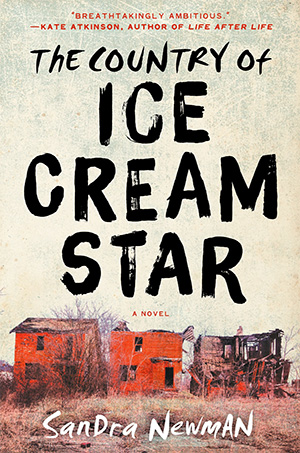
“Post-apocalyptic worlds are so ubiquitous these days that they seem normal. One of the strengths of this novel, which tells the tale of its heroine, Ice Cream Star, in a future America where no one lives past 18, is that it drives home just how strange, wild, and different such a ruined place would be. It accomplishes this task in large part through its narration in an invented, poetic dialect (which might help explain why it hasn’t landed next to The Hunger Games on the best-seller list). A little like Hanya Yanigihara’s A Little Life, this is a big book that, while not always an easy read, immerses you in its world in a way that’s not easily forgotten.” ~ Sara Goldsmith
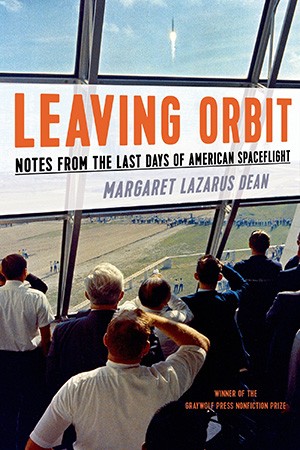 “Margaret Lazarus Dean is on what seems like a simple quest: “I want to know, most of all, what it means that we went to space for fifty years and that we won’t be going anymore.” In telling the story of American spaceflight and the last days of the shuttle program, she finds a knot of patriotism, science, ego, awe, and the very human quest to make meaning in the world. It’s the meaning that preoccupies Dean, and the result is a book more complicated and delightful than any straightforward NASA history could be.” ~Jaime Green
“Margaret Lazarus Dean is on what seems like a simple quest: “I want to know, most of all, what it means that we went to space for fifty years and that we won’t be going anymore.” In telling the story of American spaceflight and the last days of the shuttle program, she finds a knot of patriotism, science, ego, awe, and the very human quest to make meaning in the world. It’s the meaning that preoccupies Dean, and the result is a book more complicated and delightful than any straightforward NASA history could be.” ~Jaime Green
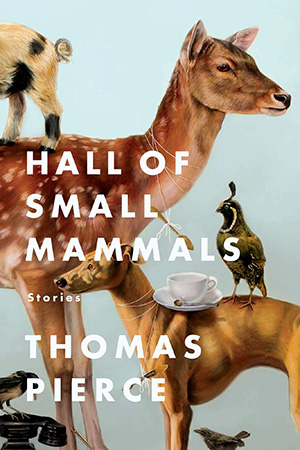 “I’m always glad to see short-story collections get attention, and this year there was a lot of talk about three great ones: Joy Williams’ The Visiting Privilege, Lucia Berlin’s A Manual For Cleaning Women, and (since it won the National Book Award last week), Adam Johnson’sFortune Smiles. But I read several other terrific story collections. Among them: Thomas Pierce’s Hall of Small Mammals, a debut which was published in January. Pierce’s masterful stories are wildly imaginative and deeply humane. They flirt with the absurd, but feel realistic and have timeless emotional heft. (In one story, an extinct woolly mammoth is cloned for a TV show and then ends up living with the TV producer’s mother.) This book got a lot of great reviews when it was published last winter and I hope it isn’t forgotten in the year-end lists.” ~Elliott Holt
“I’m always glad to see short-story collections get attention, and this year there was a lot of talk about three great ones: Joy Williams’ The Visiting Privilege, Lucia Berlin’s A Manual For Cleaning Women, and (since it won the National Book Award last week), Adam Johnson’sFortune Smiles. But I read several other terrific story collections. Among them: Thomas Pierce’s Hall of Small Mammals, a debut which was published in January. Pierce’s masterful stories are wildly imaginative and deeply humane. They flirt with the absurd, but feel realistic and have timeless emotional heft. (In one story, an extinct woolly mammoth is cloned for a TV show and then ends up living with the TV producer’s mother.) This book got a lot of great reviews when it was published last winter and I hope it isn’t forgotten in the year-end lists.” ~Elliott Holt
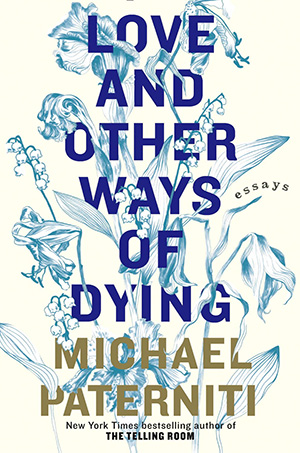 “In casting about for an overlooked book to recommend here, I very nearly overlooked Michael Paterniti’s collection Love and Other Ways of Dying, in the mistaken assumption that a book this good was unlikely to have been overlooked. (It’s easy enough, obviously, to overlook the extent to which a book has been overlooked.) Many of these 17 essays and profiles treat subjects—an 8-foot-4-inch Ukranian farmer, a Iranian who has spent most of his life stranded in Charles de Gaulle Airport, an elderly man in possession of pieces of Einstein’s brain in Tupperware container—which could, in less sensitive hands, verge on exploitation. But Paterniti is a reporter of rare skill and empathy, and a writer of measured elegance, and these pieces are exceptional artifacts of literary journalism. It’s one of the best books I’ve read all year, overlooked or otherwise.” ~Mark O’Connell
“In casting about for an overlooked book to recommend here, I very nearly overlooked Michael Paterniti’s collection Love and Other Ways of Dying, in the mistaken assumption that a book this good was unlikely to have been overlooked. (It’s easy enough, obviously, to overlook the extent to which a book has been overlooked.) Many of these 17 essays and profiles treat subjects—an 8-foot-4-inch Ukranian farmer, a Iranian who has spent most of his life stranded in Charles de Gaulle Airport, an elderly man in possession of pieces of Einstein’s brain in Tupperware container—which could, in less sensitive hands, verge on exploitation. But Paterniti is a reporter of rare skill and empathy, and a writer of measured elegance, and these pieces are exceptional artifacts of literary journalism. It’s one of the best books I’ve read all year, overlooked or otherwise.” ~Mark O’Connell
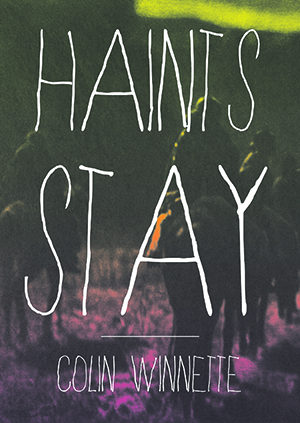 “This novel follows the adventures of brothers Brooke and Sugar, two killers for hire in the Wild West—the veryWild West, a hallucinatory world more like an acid trip than any classic Western. Case in point: the third protagonist is a young boy with no memories or lines on his palms who mysteriously wakes up between the brothers one morning. The surreality of the violence (death rites involve sawing out a person’s teeth and burying them) highlights the inherently bizarre nature of violence in the real world. This book gave me literal nightmares—but somehow in a good way.”~Lauren O’Neal
“This novel follows the adventures of brothers Brooke and Sugar, two killers for hire in the Wild West—the veryWild West, a hallucinatory world more like an acid trip than any classic Western. Case in point: the third protagonist is a young boy with no memories or lines on his palms who mysteriously wakes up between the brothers one morning. The surreality of the violence (death rites involve sawing out a person’s teeth and burying them) highlights the inherently bizarre nature of violence in the real world. This book gave me literal nightmares—but somehow in a good way.”~Lauren O’Neal
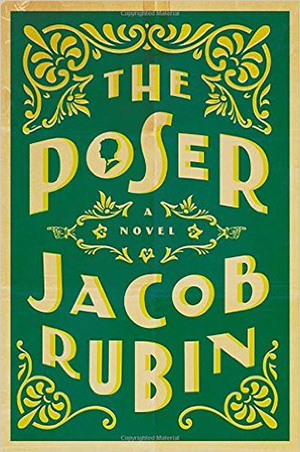 “The Poser tells the story of a guy who has an uncanny, almost uncontainable knack for impersonation. No matter who he encounters—friends, teachers, strangers on the street—he scans for what he calls the “thread,” the skein of behavior that, when imitated, conjures the original. It’s a skill that gets him into trouble as a kid and lends him surprising power—perhaps too much—once he is grown. The book, written by my friend Jacob Rubin, is full of dazzling sentences and dazzling ideas. It’s smart about what makes mimicry so devastating and what it means to see another self and take it as your own.”~Julia Turner
“The Poser tells the story of a guy who has an uncanny, almost uncontainable knack for impersonation. No matter who he encounters—friends, teachers, strangers on the street—he scans for what he calls the “thread,” the skein of behavior that, when imitated, conjures the original. It’s a skill that gets him into trouble as a kid and lends him surprising power—perhaps too much—once he is grown. The book, written by my friend Jacob Rubin, is full of dazzling sentences and dazzling ideas. It’s smart about what makes mimicry so devastating and what it means to see another self and take it as your own.”~Julia Turner
